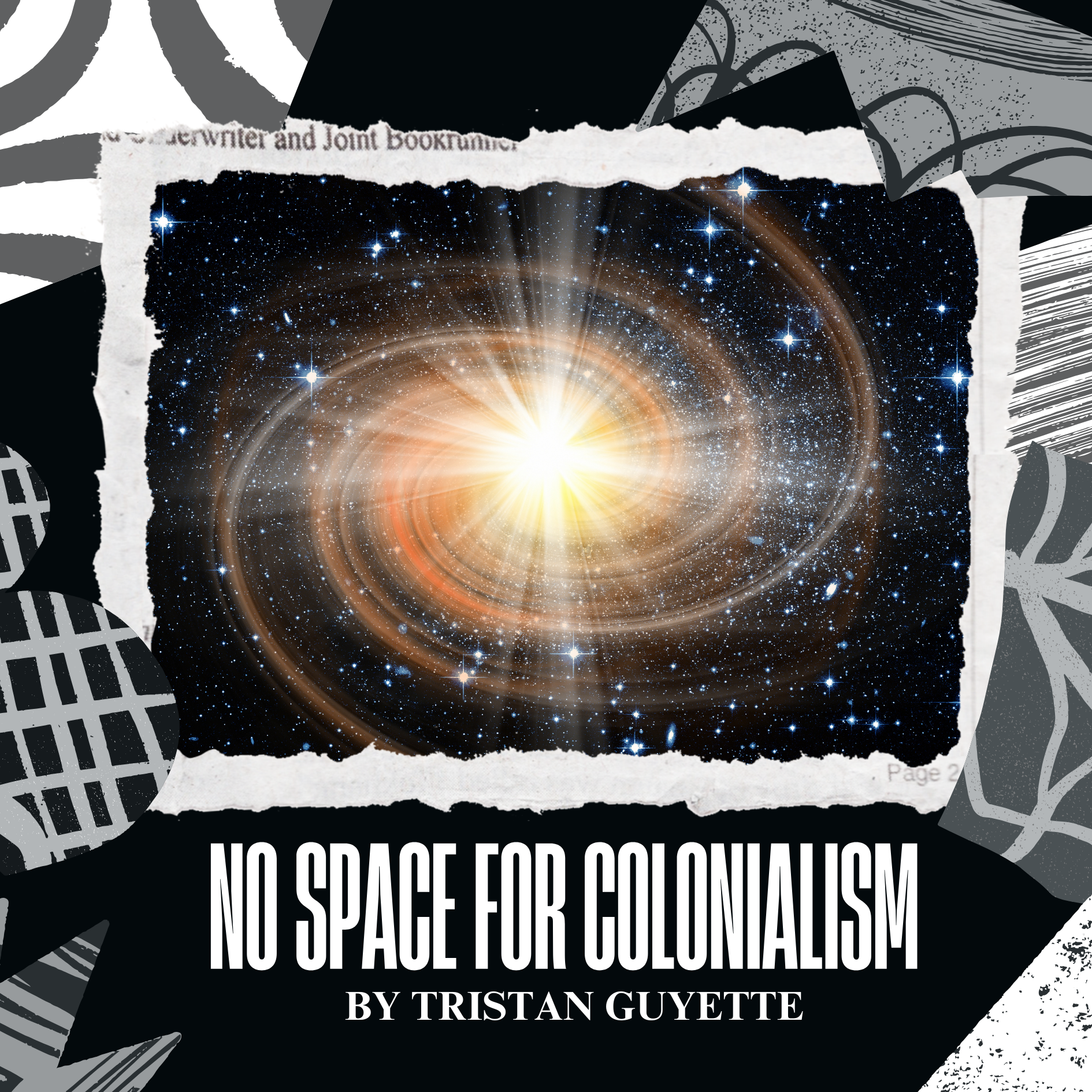No Space for Colonialism
Humankind will never run out of things to conquer. That may be a cynical take on the nature of humankind, but the history of space exploration, nearly every exploration, has yet to prove it wrong.

January 14, 2025
“Starfleet directive, General Order #1 “The Starfleet should not interfere with the social, cultural or technological development of any other planet.” – Star Trek
Humankind will never run out of things to conquer. That may be a cynical take on the nature of humankind, but the history of space exploration, nearly every exploration, has yet to prove it wrong. Not far off the heels of the Manhattan Project and the birth of the nuclear bomb, Kennedy gave his historic speech in 1962, and the language to describe the space race has rarely wavered: conquest, manifest destiny, frontiers. The language we use has consequences – much like calling nuclear testing areas “remote and uninhabited” when the reality was that hundreds of thousands living nearby would bear the weight of those tests for decades to come.
Reports of Russian ambitions to put a nuclear weapon in space surfaced in 2024, and given the Trump administration’s history of seeking to match his opponent’s capabilities, it would be reasonable to assume that Trump will once again aim to increase the US nuclear arsenal, on earth and in space. Elon Musk, Trump’s pick for his cabinet position leading the new Department of Government Efficiency, has already been working on militarizing space. While the 1967 Outer Space Treaty—ratified by both the US and Russia—prevents the stationing of nuclear weapons in orbit, the race towards the nuclear bomb has real lessons to teach us as we hurtle towards a new kind of war at the edges of the galaxy, if only we listen now.
Danger, Will Robinson
The language that surrounds space reinforces the concept that the galaxy is an empty frontier without communities to invade or civilizations to displace. This is key to many advocates that champion its necessity as a critical path towards scientific discovery. “Colonization” then, is far from “colonialism.” Just like the atomic age, communities are promised space exploration will bring scientific and medical advancements that will benefit their everyday lives, with none of the Cold War era bunkers or drills, at no cost to their homes or health.
While promising, the reality is that exploitation is already happening in our backyards, much like the development and testing of nuclear weapons. As Dr. Pamela Conrad of the Carnegie Institute of Science warned in 2023, “if something that’s not here [on Earth] is seen as a resource, just ripe to be exploited, then that [perpetuates] colonialism.” From components like uranium mined under slave labor in the Congo to above-ground weapons testing in places like New Mexico and the Marshall Islands, nuclear weapons created a cascade of harmful consequences to people and the planet.
On Earth, the impacts of space exploration are already being felt by marginalized communities. Launch sites and tracking stations are often located in areas with complex colonial histories, including the Marshall Islands where the US has placed communication bases for GPS satellites and Lockheed Martin’s “Space Fence.” The exploitation of natural resources also ties space exploration to Earth-bound inequalities. Spaceflight relies heavily on materials like aluminum, which have historically been extracted through exploitative practices in the Global South. More recently, countries like China have even sought to expand their space capabilities by exchanging satellite technology for access to natural resources in developing nations.
Permanent installations in space—Mars-a-Lago, as Keith Spencer deemed it in 2017—aren’t the threat we should be worried about. While billionaires play out their Interstellar fantasies using our own people and planet to fuel their rockets, defense contractors and governments are working in the background on a carefully choreographed race to militarize space while maintaining the thin international treaties that exist.
Houston, We Have a Problem
The 1960s kicked off a period in which over eighty countries gained independence and emerged from under the thumb of regimes that exploited their country’s lands and population for economic gain, called the decolonization movement. While the Outer Space Treaty may be viewed by some as a compromise between the US and Soviet Union, the Declaration of Equatorial States paints a clearer picture on the impact this movement had on international space diplomacy. As countries in the Global South came free from colonial rule they sought to ensure that space and its resources were free to everyone on earth, not just those rich enough to reach them first. The global decolonization movement was critical to the first treaties governing outer space, and the same principles will be again.
Every nation on Earth now depends on space-based tools to some degree, meaning that using a nuclear weapon in space would amount to a devastating act of “self-harm.” Yet, as the history of warfare grimly reminds us, nations have often chosen self-harm in desperate times. A nuclear weapon detonated in space would have the capacity to destroy infrastructure across the planet, but Russia has failed to maintain many of its satellites over the decades, and its own GPS systems are incredibly unreliable. Should Russia, for instance, make good on its threat to launch an orbiting anti-satellite (ASAT) that includes a nuclear component, the possibility of widespread outages would not have the same destabilizing effect on their own nation and would result in a considerable strategic advantage. As Clayton Swope and Makenna Young of the Center for Strategic & International Studies explain, “today, Russia has little to lose from a disruption to space access, whereas the United States has everything to lose.”
In their piece, Swope and Young go on to offer a hopeful possibility in terms of reining in Russian war-fighting in space; China may not be willing to pressure the Russian regime over their invasion of Ukraine, but the invasion of space presents a much more dire threat to China, as well as India. Both nations, much like the US, are highly dependent on their satellite networks.
Last year Russia vetoed a UN resolution reaffirming the Outer Space Treaty, though they re-introduced an alternate resolution barring counter-space weapons, or weapons that would attack satellites in orbit or their infrastructure on earth. The US opposed this resolution, but China, who had abstained from voting on the reaffirmation resolution, co-authored the Russian resolution. While China and India maintain diplomatic ties with the Russian government, the potential for their influence to keep weapons of mass destruction (and disruption) out of space is promising. These same economic and diplomatic ties were key to many nuclear treaties in the past, and the framework used to create those agreements can be seen now.
To Infinity and Beyond
Throughout decades, the international community used space exploration as a means of displaying their economic and defensive power to the rest of the world while their citizens had faith that the scientific discoveries stemming from exploration would make life on our own planet easier. This is the same vision being sold now, but the promise is not new technology to use on earth, it’s a new vision of the same nuclear bunker from the atomic age for those rich enough to afford it, and a new age of military technology.
Moving forward, it is crucial to reexamine the language and ethics surrounding space exploration. Terms like “colonization” and “conquest” carry problematic historical baggage that should not be uncritically applied to space. The nuclear arms race showed us how quickly technology can outpace ethical considerations and international law. To avoid a similar scenario in space, we must proactively address issues of equity, resource allocation, and militarization. This means not only strengthening existing space treaties but also developing new frameworks that account for emerging technologies and commercial interests. Further, it means listening to the scientists leading these discoveries, such as those at the Just Space Alliance. As we witnessed with the Manhattan Project, these experts are often first to sound the alarm when humanity and our planet are at risk.
As we venture further into the cosmos, we must recognize that the struggle for space supremacy has never simply been about scientific discovery, but about power, resources, and military advantage; it is a struggle that closely mirrors the race to create atomic weapons. The promise of technological advancement from space exploration remains alluring, but we must be vigilant about the potential for these activities to exacerbate existing global inequalities and perpetuate harmful colonial practices.
